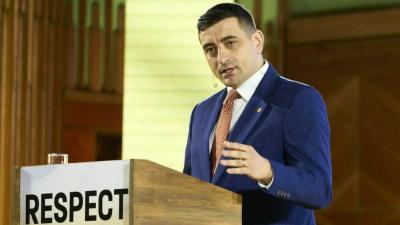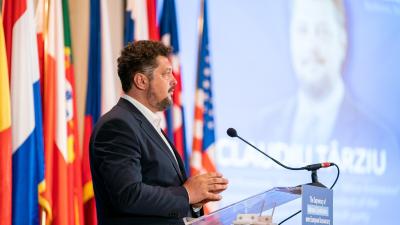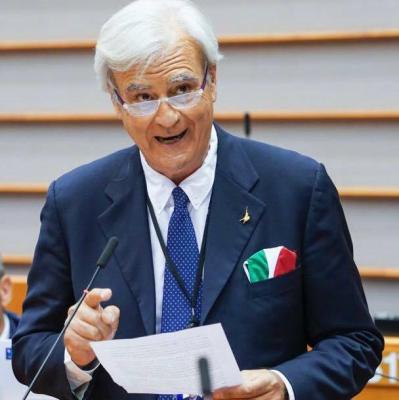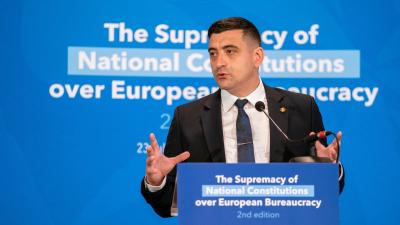Romania votes, but the label remains: stigma on George Simion and AUR resists the ballot box
The Romanian elections of this week are over, but the debate about their significance is not. George Simion, leader of the Alliance for the Union of Romanians (AUR), came in second to the current mayor of Bucharest, Nicușor Dan, who was presented as an independent candidate, although in practice he was supported by the entire centrist, progressive coalition and a good part of the establishment. The result is in itself the consequence of a high-intensity political and ideological campaign, marked by an unprecedented media demonization strategy.
Simion's defeat, if it can be called that, was neither resounding nor clean. AUR, a party that will enter parliament for the first time in 2020 with 9% of the vote, has managed in just three years to contest the presidency of the country with a national-conservative, sovereigntist proposal, critical of the Brussels bureaucracy, but unambiguously Atlanticist. This dizzying rise has activated all the sources of the Romanian political system and its international projection, including the international media, which have not hesitated to label him as "far right", "fascist" or even "pro-Russian", in open contradiction to his declarations and strategic positioning.
George Simion, leader of the AUR party, has been the subject of an unprecedented campaign of stigmatization that has determined the outcome of the election. Despite his explicit defense of the Atlantic Alliance and his support for the U.S. military presence in the country, he has been portrayed by much of the international media as pro-Russian and extremist.
During the election campaign, George Simion made his vision clear: "We need US and NATO troops on the ground today, not tomorrow. I am the only candidate who can guarantee the permanence of U.S. troops in Romania, where they will serve not only as allies, but also as a shield for our sovereignty and stability in all of Eastern Europe". Not only was there no sign of rapprochement with Moscow, but there was an explicit reaffirmation of commitment to the strategic alliance with Washington and Brussels.
The shadow of Georgescu's veto
The electoral climate has been flawed from the start. The presidential elections at the end of last year were annulled after allegations of "foreign interference" and digital disinformation. Calin Georgescu, the winner of the first round, was barred by the courts from participating in the rerun, sparking strong criticism at home and abroad for the apparent arbitrariness of the process. In this vacuum, Simion emerged as the voice of discontent, channeling the weariness of a large part of the Romanian population with a simple, direct message deeply rooted in the country's cultural, religious and national identity.
This profile, more populist than ideological, has been interpreted as a threat by a political elite that has survived for years more on institutional inertia than popular enthusiasm. Nicușor Dan himself knew how to capitalize on fear: he managed to rally liberals, social democrats and even a fringe of moderate conservatives who, although close to AUR in terms of values, fell for the "lesser evil" discourse that went viral during the campaign.
The foreign vote and the internal shield
AUR clearly won among the 1.5 million Romanians living abroad, a fact that has been overlooked in many analyses. Even if it was not enough to tip the balance at the national level, it confirms a perception: there is an important part of global Romania that identifies with the values defended by Simion. Many of them are professional émigrés who saw in AUR a defense of national dignity against uncritical subordination to Brussels.
At the national level, however, the institutional and media shield was total. AUR faced a real "cordon sanitaire" from the traditional parties. Despite being part of the European Conservatives and Reformists (ECR) group, founded by Giorgia Meloni and chaired by the Pole Morawiecki, and having visible support from the European right, the message has been systematically manipulated. Simion has been systematically excluded from relevant debates, caricatured as radical and ignored even in its international dimension.
The Atlanticist Paradox
The great absurdity of this campaign - and of the narrative that has dominated it - is the accusation of pro-Russianism. In a geopolitical context where NATO's eastern flank is essential, and in a country like Romania that hosts Europe's largest allied air base at Mihail Kogălniceanu, Simion has been one of the few leaders to stress its strategic value and the need for an increased Western military presence.
Can someone who calls for more U.S. troops be labeled pro-Putin? The logical answer would be no, but political judgments are not always governed by logic. In times of polarization, it is enough for a dissenting voice questioning the European technocratic order to be associated with the Kremlin. The same logic was at work in Hungary or Slovakia. In Romania, at least this time, it has served to prevent change.
A growing force
AUR is a young party. Its rise is explained not only by discontent, but also by a society that still retains a strong cultural, religious and national cohesion, something that Simion has been able to interpret with skill. His leadership is personalistic, yes, but also genuine. He has been able to connect with broad social strata without the need for large apparatuses or opaque financing. His style is direct, even provocative, but far from the extremism that his critics accuse him of.
Last night in the AUR headquarters, many quoted AC/DC: It's a long way to the top if you wanna rock 'n' roll. The road has not been easy and the top is still far away. But the message is clear: George Simion's political project is not over, it has just begun.
The real question Europe should be asking itself is not why AUR is growing, but why so much effort to curb it.
Read also
Claudiu Târziu: “EU must return to its roots, to its foundations and to normality”
Claudiu Târziu is a renowned Romanian public figure. He is respected not only for his political activity in the Romanian Senate, but also for his work in culture, journalism and civil society, especially in the defence of life and the family.
José Papparelli
Antonio Maria Rinaldi: “A strong Italy is necessary for Europe to be strong too”
Antonio Maria Rinaldi is one of the most recognised and popular Italian politicians. His interventions on radio and television, his forcefulness and clarity in opinions and his dialectical confrontations with his political opponents are already anthological and have made him an undisputed and appreciated media personality.
José Papparelli
“The political force that will stop the neo-Marxist madness comes from Bucharest”: An interview with George Simion
George Simion is an economist and historian who is well acquainted with the crimes of communism. He is member of the Romanian Chamber of Deputies, president and founder of the AUR party (Alianța pentru Unirea Românilor – Alliance for the Union of Romanians), which today is fighting for the lead in the presidential and European elections in 2024.












Comments (0)